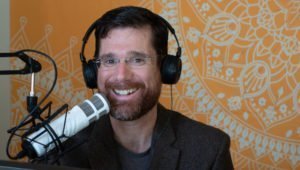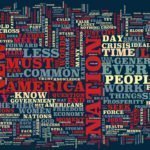
What Life’s Story are You Writing?
If your life were a story, what would that story be about? Nothing like a deep question to start us off, right? What got me thinking about this is a couple of things. As I record this episode of 99, it is the Jewish season of Pesach – Passover, where it’s customary to have a special meal called a seder, which is really an excuse for a bunch of people to get together over food to tell a particular story, and it was at one of these seders that I came across a little gem that inspired me. Before I do that, though, a reminder that the whole reason for this series (99) comes from Islam. We take one of the 99 names of the divine each week and explore its meaning in our own lives. This week, the name is one of the most famous ones – Ar Rahman. It means endless love. (I know… great song by Lionel Richie and Diana Ross). Ar Rahman includes that kind of endless love, -and- like lots of things in Islam, it’s even more expansive than that. I’ve heard this kind of love described as – get this – a container SO big, that it’s infinite. This name for the divine is said to be written on the very heart of Allah. Imagine an ocean made of love….. now imagine discovering that this ocean is so big, that it doesn’t even have a shore. Expansion. Forever. Cool, right? So back to the Seder. Here’s the quote I came across by Isaac Bashevis Singer: “When a day passes, it is no longer there. What remains of it? Nothing more than a story. If stories weren’t told or books weren’t written, humans would live like the beasts, only for the day.” (now maybe living for the day wouldn’t be so bad after all, but I digress). He goes on, “Reb Zebulun said, ‘Today we live, but by tomorrow, today will be a story. The whole world, all human life, is one long story.’ …To the storyteller yesterday is still here as are the years and the decades gone by. In stories, time does not vanish.’” So back to my original question: If your life were a story, what would that story be about? In the spirit of Ar Rahman, what part does love play in that story? A mother’s love can be this kind. Think of yourself as in the womb, protected, nourished, surrounded by this ocean of compassion. Not all of us have positive associations with mother’s love… if that is true for you, then any caregiver or compassionate presence you’ve ever felt… allow yourself to bathe in that for a moment. Feel its magical, curing power. Where is that in your life? Let me read that quote again, “When a day passes, it is no longer there. Today we live, but by tomorrow, today will be a story…. All human life, is one long story.” This is both the tragedy and the beauty of being human. Our whole life is a series of todays…. Of “right nows.” Of “this moments.” You’ve made the choice to invest in yourself by joining me right now, so you already know you care. No matter what story has already been written in your life, here you are. You’re writing this little chapter into it. What other chapters do you want to include in your story? When tomorrow comes, what do you want today to be about? One more thing. In spirit of Ar Rahman – this infinite loving presence – you are that. There is this infinite loving presence in you and in everyone else… yes… even aunt Becky. Or all kidding aside, even in the person you can’t stand…. Or can’t understand. Now com + passion means literally, “to suffer with.” Like another great song says, “We all need somebody to lean on.” Or we need someone to be with us when we’re suffering. You have the chance today to write that into your own story. Who can you be there with that could use it? The guy on the corner asking for change? How much do you really know about him? What if you bought a couple of sandwiches or coffees and came back and shared one with him while you talk for a minute? Or what about Aunt Becky (I don’t know who Aunt Becky is, or why I’m picking on her) but seriously – what if you call that person who is probably lonely or who you haven’t said “I’m sorry” to? If all this seems like too much, then maybe you’re the one who is suffering. If that’s the case, this may sound silly, but I see you. Just rest. Know that you are loved. Know that Ar Rahman says that even more than lov-ed, you ARE l-o-v-e. You. Are. Love. No matter what you’ve been through, no matter what the story that your life has written so far. Part of that story has always been love – and will always be love. Just call on me brother, when you need a hand, we all need somebody to lean on. I just might have a problem that you’d understand… If your life were a story, what would that story be about? I know one part of that story. And I can’t wait to hear what else you decide to include. Series NavigationHow to Care for Your Soul >>











